Learn how to talk about yourself in French and ask others about themselves.
The 1-2-3 challenge
Join Scottish pupils as they give French a go!
Listen and guess what they are saying before trying yourself.
BOY 1: Ça va
GIRL 1: Je suis calme
BOY 2: Je suis triste
GIRL 2: Je suis content
Tip: This video can be used as an interactive introduction to this topic or as a recap on key vocabulary and phrases already learnt.
Remember!
It doesn't matter if your pronunciation isn't perfect. Try your best and have fun!
How to say your name in French
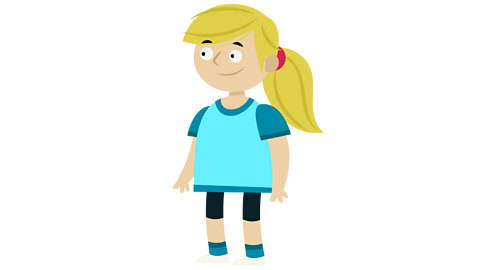
If you want to say something about yourself in French, you use the word for 'I' – Je.
So if you want to say 'I am called', you say Sorry, something went wrongCheck your connection, refresh the page and try again.:
- Sorry, something went wrongCheck your connection, refresh the page and try again. - I am called Aimée
- Sorry, something went wrongCheck your connection, refresh the page and try again. - I am called Anil
Here appelle means 'call' so it's like saying 'I myself call'.

Asking someone's name
If you want to ask someone else's name, you use the word tu (you) and the question word comment (how):
- Sorry, something went wrongCheck your connection, refresh the page and try again. - What are you called?
Did you notice that the word for 'call' is before the word for 'you'? Sometimes the order of the words is different in French. So it is like saying 'how do you call yourself?'.
Saying how old you are
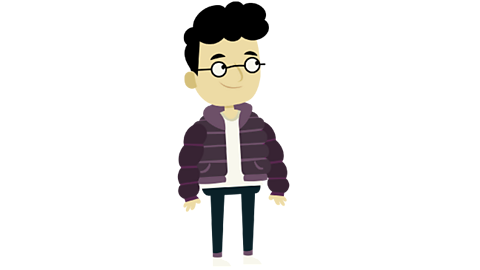
In English, you use the verb 'to be' to say how old you are but in French, you use the verb 'to have' - avoir:
J'ai __ ans
Sorry, something went wrongCheck your connection, refresh the page and try again. - I am seven years old
So it is like saying 'I have seven years' rather than 'I am seven years old' as we do in English.
Did you notice that the word for 'I' has changed from Je to J'? This is because it appears in front of a vowel.
Here are some useful phrases to practise saying how old you are:
| French | English |
|---|---|
| Sorry, something went wrongCheck your connection, refresh the page and try again. | I am seven years old |
| Sorry, something went wrongCheck your connection, refresh the page and try again. | I am eight years old |
| Sorry, something went wrongCheck your connection, refresh the page and try again. | I am nine years old |
| Sorry, something went wrongCheck your connection, refresh the page and try again. | I am ten years old |
| Sorry, something went wrongCheck your connection, refresh the page and try again. | I am eleven years old |
Asking someone's age
To ask someone how old they are, you first need a question phrase Sorry, something went wrongCheck your connection, refresh the page and try again. (what age).
Then use the word for 'you' – Sorry, something went wrongCheck your connection, refresh the page and try again. with 'have' – Sorry, something went wrongCheck your connection, refresh the page and try again..
- Sorry, something went wrongCheck your connection, refresh the page and try again. – How old are you?
So it is like saying 'What age do you have?'.
Saying how you feel
You can explain how you are feeling by using the phrase Sorry, something went wrongCheck your connection, refresh the page and try again. ('I am') and adding an emotion:
- Sorry, something went wrongCheck your connection, refresh the page and try again. - I am calm
Here are some more emotion words. Some have different masculine and feminine versions:
| English | French (m) | French (f) |
|---|---|---|
| calm | Sorry, something went wrongCheck your connection, refresh the page and try again. | Sorry, something went wrongCheck your connection, refresh the page and try again. |
| sad | Sorry, something went wrongCheck your connection, refresh the page and try again. | Sorry, something went wrongCheck your connection, refresh the page and try again. |
| angry | Sorry, something went wrongCheck your connection, refresh the page and try again. | Sorry, something went wrongCheck your connection, refresh the page and try again. |
| happy | Sorry, something went wrongCheck your connection, refresh the page and try again. | Sorry, something went wrongCheck your connection, refresh the page and try again. |
| surprised | Sorry, something went wrongCheck your connection, refresh the page and try again. | Sorry, something went wrongCheck your connection, refresh the page and try again. |
| tired | Sorry, something went wrongCheck your connection, refresh the page and try again. | Sorry, something went wrongCheck your connection, refresh the page and try again. |
| busy | Sorry, something went wrongCheck your connection, refresh the page and try again. | Sorry, something went wrongCheck your connection, refresh the page and try again. |
| nervous | Sorry, something went wrongCheck your connection, refresh the page and try again. | Sorry, something went wrongCheck your connection, refresh the page and try again. |
Saying where you live
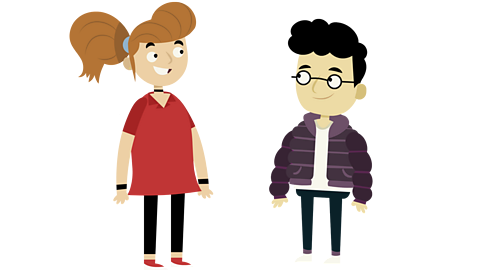
To tell someone where you live, you use the verb Sorry, something went wrongCheck your connection, refresh the page and try again. (to live).
As habiter starts with a silent h, when you put je (I) in front of it, it changes to j' to make it easier to say:
- Je + habite = J'habite - I live
Then you add Ă which means 'in' when you are talking about a town or city.
- Sorry, something went wrongCheck your connection, refresh the page and try again.
Try using the phrases below to say where you live or add your own town at the end.
| French | English |
|---|---|
| Sorry, something went wrongCheck your connection, refresh the page and try again. | I live in Shetland |
| Sorry, something went wrongCheck your connection, refresh the page and try again. | I live in Stornoway |
| Sorry, something went wrongCheck your connection, refresh the page and try again. | I live in Inverness |
| Sorry, something went wrongCheck your connection, refresh the page and try again. | I live in Aberdeen |
| Sorry, something went wrongCheck your connection, refresh the page and try again. | I live in Dundee |
| Sorry, something went wrongCheck your connection, refresh the page and try again. | I live in Edinburgh |
| Sorry, something went wrongCheck your connection, refresh the page and try again. | I live in Glasgow |
| Sorry, something went wrongCheck your connection, refresh the page and try again. | I live in Dumfries |

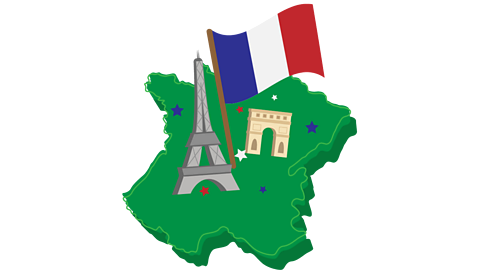
To talk about the country where you live, you use the word Sorry, something went wrongCheck your connection, refresh the page and try again. for 'in' (most of the time):
Sorry, something went wrongCheck your connection, refresh the page and try again. – I live in Scotland
Sorry, something went wrongCheck your connection, refresh the page and try again. – I live in England
Sorry, something went wrongCheck your connection, refresh the page and try again. – I live in Northern Ireland
Sorry, something went wrongCheck your connection, refresh the page and try again. – I live in France
The exception is where you use au instead of en:
- Sorry, something went wrongCheck your connection, refresh the page and try again. – I live in Wales
Saying where you come from
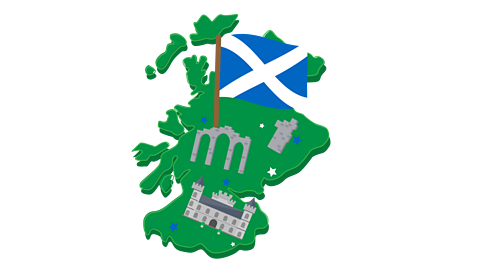
To say where you come from, you use part of the verb venir ('to come') followed by de ('from').
Sorry, something went wrongCheck your connection, refresh the page and try again. – I come from
The spelling of de changes depending on which country it comes before. De changes to d' when the country starts with a vowel:
Sorry, something went wrongCheck your connection, refresh the page and try again. – I come from Scotland
Sorry, something went wrongCheck your connection, refresh the page and try again. – I come from England
Sorry, something went wrongCheck your connection, refresh the page and try again. – I come from Northern Ireland
De changes to du when it appears before a country that is a masculine noun, like le pays de Galles:
- Sorry, something went wrongCheck your connection, refresh the page and try again. – I come from Wales

Below are the names of some other countries in French. Try using them to say where you come from.
Notice that in French you use the definite article le, la or l' (the) in front of the country.
Download the PDF for a list of different countries in French.

Key French sounds
Below are some important French sounds that you have heard in this topic. Try practising them yourself out loud.
- e
When the letter e is followed by two consonants in French, it makes the sound like e in 'egg'.
Don't forget that the e at the end of the word is silent.
Sorry, something went wrongCheck your connection, refresh the page and try again.
- eu
This is not an English sound. Imagine that your have seen something unpleasant, open your mouth a little and sound disgusted.
Sorry, something went wrongCheck your connection, refresh the page and try again.
- j
The letter j always makes the sound like s in the English word 'television'.
Sorry, something went wrongCheck your connection, refresh the page and try again.
More on Talking topics
Find out more by working through a topic
- count2 of 12

- count3 of 12

- count4 of 12

- count5 of 12
